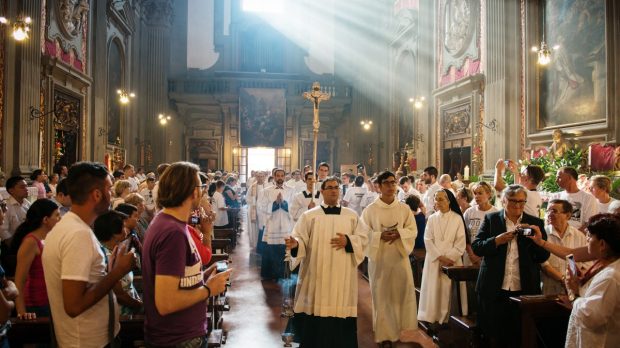Lenten Campaign 2025
This content is free of charge, as are all our articles.
Support us with a donation that is tax-deductible and enable us to continue to reach millions of readers.
A thriving parish is a wellspring of grace, a place of welcome, peace, and missionary discipleship. If you belong to that kind of parish, count your blessings!
Sadly, odds aren’t great that you do. Many young Catholics today have never experienced what it’s like to belong to a thriving parish, a fact that is both a symptom and a cause of the modern crisis of Catholics leaving the Church.
To understand some of the history of this crisis, I turned to a recently published book, The Prodigal Church by Brandon McGinley, which offers a bracing and practical “roadmap for renewal” of the Church today. Not surprisingly, much of the book focuses on parish life.
One of the most memorable sections outlines what you can expect to find at a truly thriving, vibrant parish. Check out the book for lots more ideas and information! If you’re curious, here’s what it looks like when a parish community is united in its mission of serving Christ.
1The parish makes Jesus “as accessible as possible”
The Eucharist is the “source and summit” of the Christian life and consequently of every Catholic parish. Thus the parish can fulfill its supernatural purpose best by offering as many opportunities as possible for the people of God to be together with Our Lord.
Frequent and readily available access to the sacraments is vital, first of all, and not only the Holy Mass but also baptism, confession, and even the Anointing of the Sick. The parish is a fountain of sacramental grace: Lavishly dispensing the sacraments is absolutely the first and most important part of its mission. Nothing should come before this. McGinley writes,
“The parish church shouldn’t feel like a business or office that keeps convenient hours only: It is a wellspring of grace to the faithful and to the wider community, and we should present it to the world as such.”
After that, anotherway to be centered on Jesus is to arrange the rhythm of parish events around the liturgical life of the Church. Integrating the liturgical calendar into parish life, such as by planning special devotions for holy days and pegging fundraisers to liturgical feasts, helps the whole community to live liturgically together.
2The parish is welcoming place for all who enter
A parish that is on fire for Christ is a sanctuary: a genuinely welcoming place, showing Christ’s love to the world. “Every parish can be not just a home for Jesus, but a beacon of his light and love and peace.”
Bringing people together in Christ is part of the parish’s supernatural mission. McGinley writes,
“Every parish should be ready to welcome any person who shows up, even if with just a smile and a referral to a trusted organization. To the extent possible, though, that welcome should go deeper: a food pantry or soup kitchen, a pay-what-you-can cafe or a few clean beds and a shower; a place simply to be without fear or judgment.
This is the parish as an island of dignity in a world of exploitation, an island of rest in a world of hustle, an island of security in a world of precarity. This is the parish as sanctuary not just of Jesus in the Blessed Sacrament, but Jesus in the poor.”
3The parish is a haven of peace for the faithful
“Regardless of size or expectations of decline (or expansion), [the parish] can be a place of social and spiritual security where we can find rest,” McGinley writes. “That rest begins with Jesus.”
Again, it all goes back to being firmly and fully rooted in love of Christ. Unfortunately, Christ’s peace and love is not always at the forefront on the local scene. McGinley writes, “Like academia and local government, Catholic parishes have a reputation for fostering behind-the-scenes drama.”
But any of this infighting, backbiting, or social climbing is “the spirit of decline, not the spirit of renewal.” “The parish claims to be the home of Jesus Christ, and should act like it.”
How are these all-too-common missteps to be avoided? Again, only through seeking close union with God. “The parish will not be a place of peace until it is a place of grace. Without grace, there is no enduring principle of unity that can overcome our squabbling,” McGinley writes. “Without grace, there can be no reconciliation with our fellow men because there can be no reconciliation with Christ.”
The pastor has an essential role to play here. The example of his life, peaceable and fatherly, sets the tone for the entire parish. He “orients his flock toward their final goal.”
4The parish is a place where people want to be
Ideally, the parish is central to the life of the local people of God, and people want to be there beyond their weekly liturgical duty. Parishioners are actively involved and engaged with various kinds of events and organizations. It should feel like “a home away from home”:
“The parish should be a home away from home, not just in the sense that it’s a sanctuary for prayer, but in that it’s a place where you spend time, where you can just be, without expectation or anxiety.”
This feeling naturally arises from the Christlike welcome and peace that should be prioritized. In this way, the parish can be “a place where the transformative power of grace is demonstrated, where the radicalism of the Christian message and way of life is shown to be credible and beautiful.”
5The parish reaches out to the wider world
Transformed by Christ, the soul desires to share Christ’s love with others. In the same way, the parish community that is alive with Christ naturally extends his charity and mercy to the wider world.
“One of the duties of the parish is to extend the grace of the sacraments to the surrounding community,” McGinley writes, or in other words, “being salt and light to the world through Christ-like service, in body and soul.”
This service might manifest in various works of mercy, charity, and justice.
“The parish, after all, is the natural place where the corporal works of mercy are performed. The parish has a fuller understanding of the community’s needs, and a fuller ability to coordinate a response to them, than any individual or family does … The parish should be a place where the marginalized—the poor, the migrant, the mentally ill—can always go and be assured of being treated with dignity.”
Ideally, “the general public knows that the Catholic parish, whether in a booming suburb or a rusty city neighborhood, is a place of refuge, a place where the regular rules of fear and insecurity don’t apply, a place where the reality of Christ’s presence in the Eucharist is manifested in bold service and unselfish love.”
Ultimately, it all comes back to the first point: A thriving parish is a place where its people are unfalteringly pointed toward Christ. “As long as parish life relentlessly directs people to Christ, it cannot fail.”


